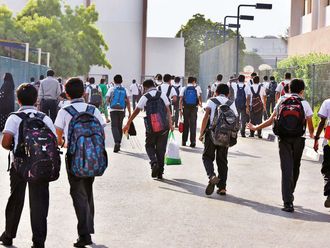There is a massacre in the making close to Turkey’s border with northern Syria. The US has admitted that air strikes alone cannot prevent Daesh from capturing the Kurdish town of Kobani (Ain Al Arab) that is being bravely defended by several hundreds of its 40,000 citizens despite their lack of heavy weapons or night-vision goggles.
At the time of writing, more than 40 per cent of the town has been overrun by Daesh extremists who have set their sights on other bordering towns. No surprise there because if the Kurds on the ground are to be believed, American air strikes are little more than token. Such a half-hearted US response is suspicious at best and, at worst, sends the message that the mightiest air force on the planet is ineffective. Obama has ruled out putting boots on the ground to allay the fears of the American public that he was embroiling their troops in yet another unpopular Middle East war on the heels of Iraq and Afghanistan, which cost the US dear in terms of lives, revenue and soiled international reputation.
It is only a matter of time before the slaughter of those who refuse to sign-up to the terrorists’ distorted version of Islam plays out on our screens. Yet, the Turkish government showed initial reluctance to step in and join the fight. Yesterday, Turkey agreed for the US to use its military bases for operations against Daesh as part of a new agreement, which also includes the training of moderate Syrian rebels. But will this agreement be enough to stop the killing of innocent civilians?
Turkish President Recep Tayyip Erdogan had earlier spelled out the conditions during a visit to Syrian refugees — he wanted the coalition to impose a no-fly zone over areas of Syria, a buffer zone around the Turkish-Syrian borders and a concerted effort to topple his former close friend Bashar Al Assad to include bolstering the capabilities of Syrian opposition fighters.
Regardless of the merits or otherwise of that plan, human lives should not be treated as bargaining chips or haggled over like carpets in a souq. The fate of Kurdish men, women and children under imminent threat should be considered a humanitarian obligation. Instead, Turkish forces are reduced to mere spectators, watching plumes of smoke billow above the besieged town where the terrorists’ black flags have been hoisted high. The people’s cries for help are being ignored unless and until the US-led coalition concedes to their government’s demands. No doubt there is an even greater angst in Kobani as to why the much-touted American values are not motivating the White House to launch its own rescue mission.
Worse, Kurds on the Turkish side of the border — many of whom had earlier fled Kobani to escape the advance of Daesh — are being forcibly prevented from returning home to assist their brethren. Ankara’s relationship with the Kurds has long been fractious and at times bloody — and such inaction on Turkey’s part — especially since the Turkish parliament voted to permit its country’s armed forces to engage in both Iraq and Syria — opens the door to questions about which side the Turkish government supports.
Turkish government officials have been quick to rebut accusations that it has been conspiring with Daesh, whose sinister black-clad killers were crossing the border at will to shop for mobile phones and uniforms. The US Vice-President, Joe Biden, elucidated what many in western capitals have been thinking. He blamed Turkey for financing and arming Daesh for which he subsequently apologised. “Mr Biden used such language ... that would make him a man of the past for me,” countered Erdogan shortly afterwards.
More importantly, Erdogan and Prime Minister Ahmet Davutoglu risk their country’s internal security if they do not take up a more forceful position in the fight against Daesh. Turkey’s 15 million Kurdish population is not going to sit idle, watching the unimpeded extermination of their kinfolk while their country, a member of Nato with more than 600,000 active military personnel, haggles with Washington. Ethnic Kurds are rioting in cities all over, setting fire to buildings, stores and buses. Their fury is understandable.
Linda S. Heard is a specialist writer on Middle East affairs. She can be contacted at lheard@gulfnews.com







